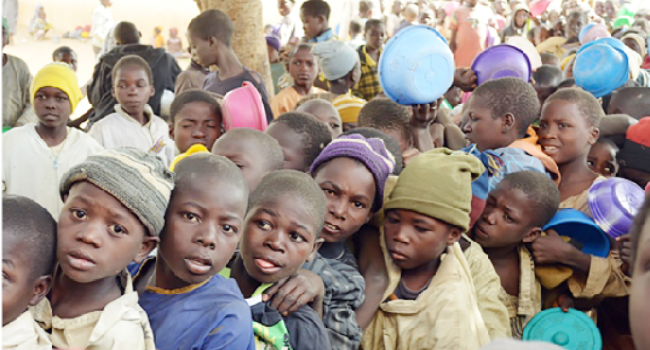Nigeria has a serious problem of out-of-school children, according to UNESCO, Nigeria has about 20 million out-of-school children, which is the highest number in the world. This means that one in every five of the world’s out-of-school children is in Nigeria. Despite the official policy of free and compulsory primary education, many children aged 5-14 years are not in school due to various factors such as poverty, conflict, and gender discrimination.
In December 2023, UNICEF (Nigeria) provided a detailed breakdown of the situation. They revealed that approximately 10.2 million children, who should ideally be attending primary schools, are instead found wandering the streets. The number of out-of-school children in the Junior Secondary School (JSS) category exceeds 8.1 million. The Basic Education Act, championed during the Olusegun Obasanjo administration, mandates that every Nigerian child must complete nine years of continuous basic education, covering both primary and JSS levels.
Recently, the Senate proposed legal action against parents who fail to send their children to school in line with the Universal Basic Education Act. They called for the establishment of mobile courts to try such parents and guardians. This is to reduce the 20 million load of Out-of-school children (OSC, which Nigeria is burdened with.
The Senate’s proposal to prosecute negligent does not quite address the issue. A short-term approach—a common trend among the current leadership.
The northern states of Nigeria bear the highest burden of out-of-school children. These states include Borno, Yobe, and Adamawa. The ongoing insecurity issues has significantly disrupted academic activities in these regions, leading to a large number of children being deprived of education. The situation is particularly dire in these areas, and addressing it requires urgent attention and targeted interventions to ensure that every child has access to quality education.
In the North, for instance, the Al Majiri Islamic system of education is deemed sufficient by the grassroots population, in this system, boys are entrusted to Quranic teachers who often send them out to beg, while girls are assigned to street vending and are often married off at a young age. In the southern regions of the country, this phenomenon is less prevalent, but still, some out-of-school children engage in street vending or work as domestic helpers.
Furthermore, the issue of Parental negligence can be traced to the inability of parents to send their children to school. This is where poverty weighs in. Also, the refusal of parents to do so as a result of certain cultural factors. In some parts of the country, Western education is still strongly resisted, especially by the ignorant poor.
In addressing this issue of out-of-school hostilically, the Basic Education Act must be implemented to the letter. This scheme lifts the financial burden off the parents, and discounts poverty as a factor incubating the OSC syndrome in Nigeria.
Cash grants will be effective in encouraging families to send their children to school. In north-west Nigeria, for instance, cash grants are helping get more girls back to school through programs like the Educate A Child (EAC) education partnership program
Providing financial incentives to families can alleviate economic barriers, scholarships, stipends, and free school meals can motivate parents to enroll their children in school just like the National Home-Grown School Feeding Programme (NHGSFP) that was innitiated during Mohammed Buhari administration. Well-fed children are more likely to attend school regularly and actively participate in learning. Also, Incentives for teachers, such as better salaries and professional development will enhance the quality of education. Well-trained teachers create a conducive learning environment.
Educating our children is an essential responsibility that cannot be overlooked.
